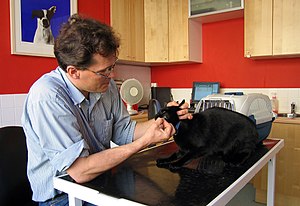Veterinary medicine
Veterinary medicine is the application of medical, diagnostic, and therapeutic principles to companion, domestic, exotic, wildlife, and production animals. Veterinary Science is concerned with the scientific basis of animal production, health and disease. It requires the acquisition and application of scientific knowledge in several disciplines and uses technical skills towards the solution of animal production, health, management and welfare problems.

Veterinary medicine is informally as old as the human/animal bond but in recent years has expanded exponentially because of the availability of advanced diagnostic and therapeutic techniques for most species. Animals nowadays often receive advanced medical, dental, and surgical care including insulin injections, root canals, hip replacements, cataract extractions, and pacemakers.
Veterinarians assist in ensuring the quality, quantity, and security of food supplies by working to maintain the health of livestock and inspecting the meat itself. Veterinary scientists are very important in chemical, biological, and pharmacological research.
In many countries, equine veterinary medicine is also a specialized field. Clinical work with horses involves mainly locomotor and orthopaedic problems, digestive tract conditions (including equine colic, which is a major cause of death among domesticated horses), and respiratory tract infections and disorders.
As in the human medical field, veterinary medicine (in practice) requires a diverse group of individuals to meet the need of patients. In addition to veterinarians, many veterinary hospitals utilize a team of veterinary nurses and veterinary assistants to completely care for healing, critical and well animals. Veterinary nurses are generally registered as "veterinary technicians" in most states and are legally qualified to assist veterinarians in many medical procedures. Veterinary assistants, who are not licensed by most states, but can be well-trained at facilities such as The School for Veterinary Assistants, are also becoming increasingly in-demand in the veterinary industry due to a wide range of treatments and services being offered to meet the higher expectations of pet owners in the United States.
See also
- American Veterinary Medical Association
- Veterinary surgery
- Avian veterinarian
- Equine veterinarian
- Exotic Animal veterinarian
- List of veterinarians
- Schools of veterinary medicine
- Veterinary technician
- Veterinarian
- Veterinarian's Oath
- Veterinary informatics
- Veterinary school
External links
- Veterinarian Software Information Clearinghouse - Presents a list of veterinary software packages and reviews of major systems
- Ask A Librarian - Website for locating Human Medical and Health and Veterinary Information
- Quick & Dirty Vet School Application Guide - Website with information and links about the application process for vet school.
| Veterinary Practitioners | Edit |
|---|---|
| Veterinarian | Veterinary technician | |
